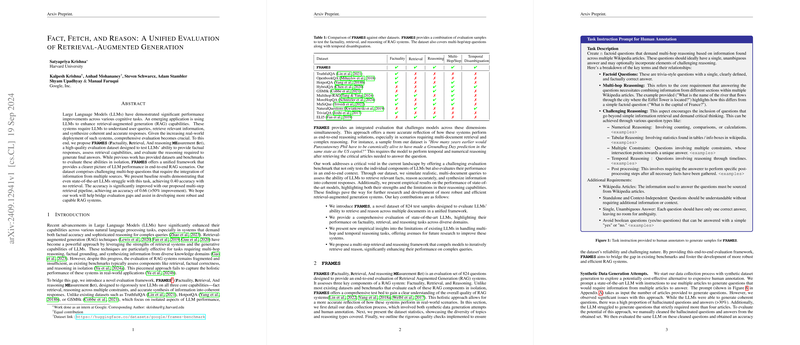Fact, Fetch, and Reason: A Unified Evaluation of Retrieval-Augmented Generation
The paper "Fact, Fetch, and Reason: A Unified Evaluation of Retrieval-Augmented Generation" presents a novel evaluation framework targeting the performance of Retrieval-Augmented Generation (RAG) systems. Authored by researchers from Harvard University and Google, the paper is anchored on the growing prominence of LLMs in executing complex natural language processing tasks that necessitate accuracy and sophisticated reasoning.
Introduction
The paper identifies a significant gap in the current landscape of RAG systems evaluation. Existing benchmarks typically isolate the assessment of retrieval capabilities, factual correctness, and reasoning abilities, which fails to capture how these models perform in holistic, end-to-end tasks. The authors introduce a new dataset designed to evaluate these components in a unified manner.
Methodology
The dataset is comprised of 824 challenging, multi-hop questions derived from Wikipedia articles. These questions require the integration of information from multiple sources, mirroring real-world scenarios where factual retrieval, multi-step reasoning, and accurate information synthesis are crucial. The paper outlines the design of the dataset, emphasizing its uniqueness in providing comprehensive tests across various domains—something not adequately addressed by isolated benchmarks like TruthfulQA or HotpotQA.
Data Collection
Data collection involved both synthetic generation and human annotation. Initially, synthetic data were generated using state-of-the-art LLMs, but these efforts revealed significant issues with hallucinated questions and answers, necessitating extensive manual cleaning. Subsequently, human annotators were employed to ensure the generation of high-quality questions that require multi-hop reasoning and meet the specific criteria outlined by the researchers.
Dataset Characteristics
The dataset covers a broad spectrum of topics and reasoning types, including numerical, tabular, temporal, and post-processing reasoning. This comprehensive coverage ensures robust evaluation across varied logical constructs essential in real-world applications. Quality checks were rigorously implemented, including verification of correctness, grounding to Wikipedia, and the removal of ambiguous or outdated questions.
Empirical Analysis
Single-Step Evaluations: The paper first evaluates LLMs using several baseline prompting methods without retrieval augmentation, employing a naïve prompt, BM25-retrieved prompts, and an oracle prompt containing all relevant ground-truth articles. Results indicate that naïve prompting achieves approximately 40% accuracy, with marginal improvements when incorporating BM25 retrieval, highlighting the limitations in the current capabilities of single-step evaluations. The highest performance using an oracle prompt was 72%, indicating the potential upper bound of model performance.
Multi-Step Evaluations: The paper introduces a multi-step retrieval framework, allowing iterative refinement of the context through query generation and retrieval. This approach is shown to significantly enhance performance, achieving up to 66% accuracy with five iterations, approaching the oracle benchmark. This substantial improvement underscores the importance of iterative retrieval and reasoning processes in handling complex queries.
Implications and Future Work
The findings have critical implications for the development of RAG systems. The notable variance in performance based on types of reasoning tasks suggests targeted areas for improvement, particularly in numerical, tabular, and post-processing reasoning. The multi-step framework demonstrates a clear path forward for enhancing the retrieval and reasoning capabilities of LLMs.
Future Research Directions:
- Advanced Retrieval Strategies: Exploring dense retrievers like ColBERT or SimCSE which are specifically trained for multi-hop tasks.
- Enhanced Reasoning Techniques: Investigating process supervision methods or distillation techniques from successful query-answering trajectories.
- Dataset Expansion: Including more diverse, domain-specific, and real-time information could further challenge and improve RAG systems.
- Contamination Mitigation: Address potential contamination from pretraining data to ensure the reliability and generalizability of the evaluations.
Conclusion
The paper offers a robust evaluation framework that bridges significant gaps in the current methodologies of assessing RAG systems. By presenting empirical results and a detailed analysis, it provides insights into the current capabilities and limitations of state-of-the-art LLMs. The multi-step retrieval and reasoning framework proposed serves as a promising direction for future improvements, aiming towards the development of more robust, efficient, and reliable RAG systems.
This essay provides an expert overview of the paper, focusing on its methodology, dataset characteristics, empirical findings, and implications for future research. The paper's comprehensive approach to evaluating RAG systems marks a significant contribution to the field, offering a nuanced understanding of the interplay between retrieval, reasoning, and factual accuracy in LLMs.
